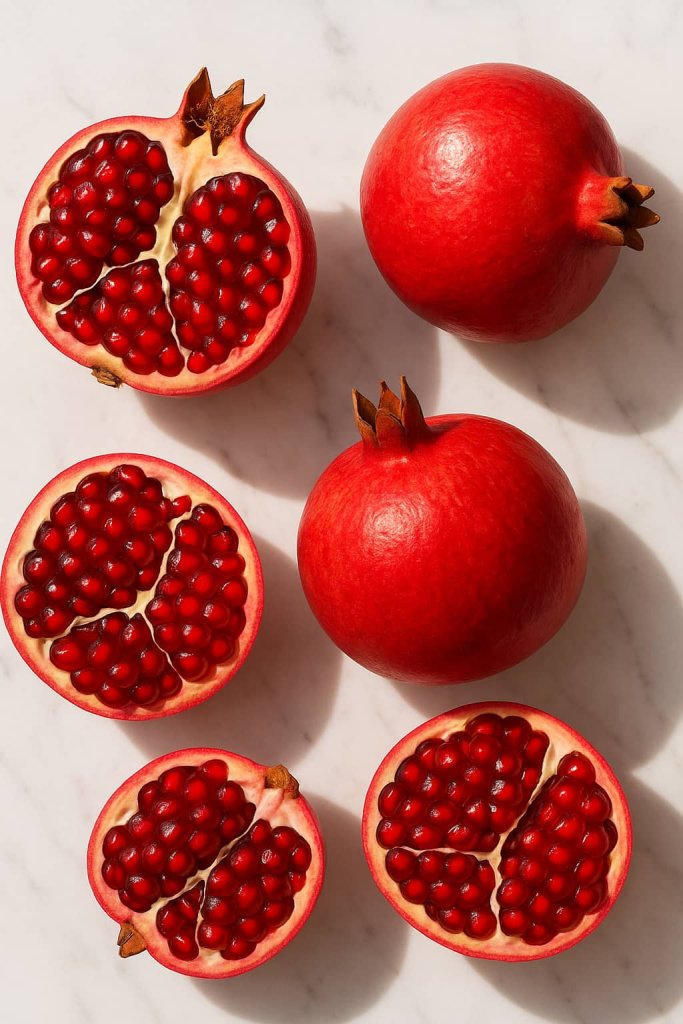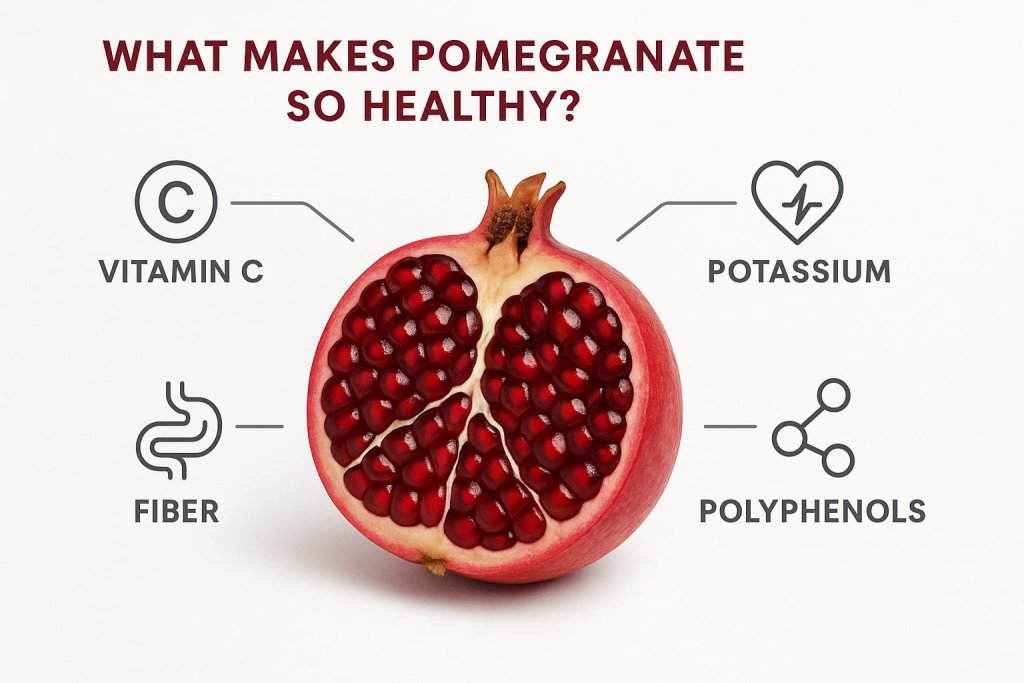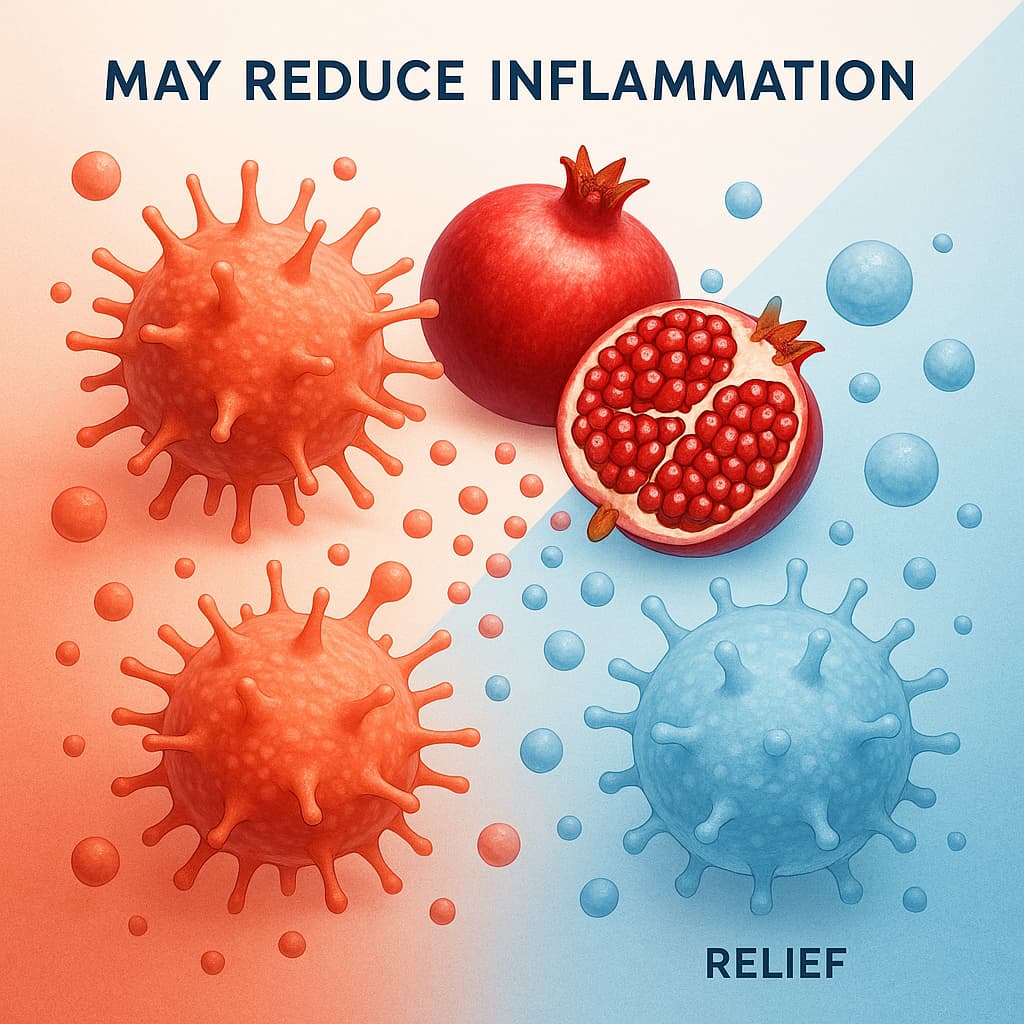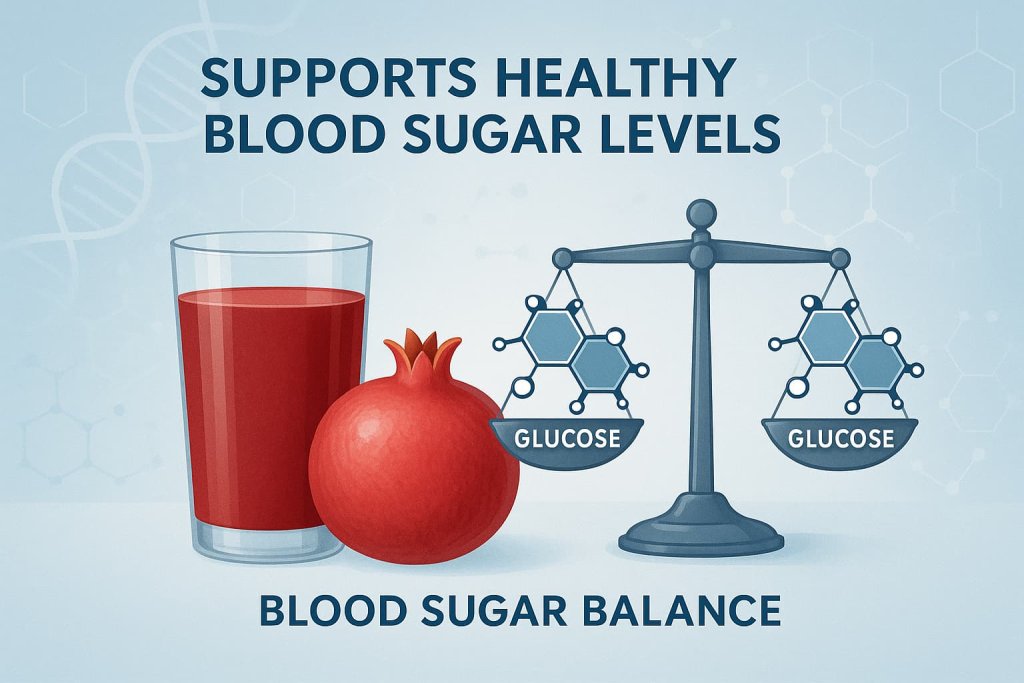Pomegranates are rich in antioxidants and polyphenols that may support heart health, reduce inflammation, and promote overall wellness.
This vibrant red fruit isn’t just delicious — it’s one of nature’s most nutrient-dense foods, offering a wide range of science-backed benefits. Understanding how pomegranate supports your body can help you make smarter choices for heart, gut, and skin health.

What Makes Pomegranate So Healthy?
Pomegranate (Punica granatum) is more than just a colorful fruit — it’s a powerhouse of nutrients and protective plant compounds. Its seeds, known as arils, are rich in vitamins, minerals, and potent antioxidants that may support heart, brain, and immune health.
According to the USDA FoodData Central (2024), 100 grams of raw pomegranate arils provide an excellent nutritional balance of fiber, vitamin C, and potassium with relatively few calories.
| Nutrient (per 100 g arils) | Amount | % Daily Value (approx.) |
|---|---|---|
| Calories | 83 kcal | — |
| Water | 78 g | — |
| Carbohydrates | 18.7 g | — |
| Fiber | 4 g | 14 % |
| Protein | 1.7 g | 3 % |
| Vitamin C | 10 mg | 17 % |
| Folate (B9) | 38 µg | 10 % |
| Potassium | 236 mg | 7 % |
| Polyphenols (Punicalagins, Ellagic acid, Anthocyanins) | — | — |

Pomegranate’s deep red color comes from anthocyanins, while its juice and peel are rich in punicalagins — highly active antioxidants shown to neutralize harmful free radicals and support vascular and cellular health.
These bioactive compounds are the main reason pomegranate is linked to benefits like reduced oxidative stress, balanced inflammation, and improved metabolic function. Including the whole fruit (rather than just juice) adds fiber, which supports digestion and blood-sugar balance naturally.
10 Proven Health Benefits of Pomegranate (Backed by Science)
Pomegranates are a nutrient-dense fruit loaded with antioxidants, vitamins, and polyphenols that support multiple aspects of health.
Modern scientific research highlights their role in heart protection, inflammation reduction, metabolic balance, and overall vitality.
1. Supports Heart Health

Pomegranate juice and extracts are well-studied for their potential to support cardiovascular wellness.
According to research from the Harvard T.H. Chan School of Public Health, the polyphenols in pomegranate — especially punicalagins and anthocyanins — may help relax blood vessels, lower systolic blood pressure, and reduce the oxidation of LDL cholesterol.
These effects collectively promote better blood circulation and vascular function.
Regular consumption of pomegranate juice or the whole fruit may:
- Improve blood flow and arterial flexibility
- Support healthy blood pressure levels
- Reduce oxidative stress that contributes to plaque formation
Pomegranates are thus considered a heart-friendly fruit that supports long-term cardiovascular health when consumed as part of a balanced diet.
2. Rich Source of Antioxidants

Pomegranate ranks among the top antioxidant-rich fruits, thanks to its high concentration of polyphenols, flavonoids, and tannins.
The vibrant red color comes from anthocyanins and punicalagins, which may help neutralize harmful free radicals and protect cellular DNA.
A 2023 study published in Antioxidants (MDPI) found that the antioxidant capacity of pomegranate juice exceeded that of red wine and green tea — both known for their potent free-radical-fighting properties.
By supporting the body’s natural defense mechanisms, pomegranate helps maintain cellular integrity and longevity.
(Source: MDPI – Antioxidants Review on Pomegranate)
3. May Reduce Inflammation

Chronic inflammation contributes to conditions such as arthritis, obesity, and cardiovascular disease.
Pomegranate polyphenols may down-regulate inflammatory markers like C-reactive protein (CRP), IL-6, and TNF-α.
In clinical studies published in Antioxidants (MDPI, 2023), daily consumption of pomegranate extract improved antioxidant enzyme activity and lowered oxidative stress in healthy adults.
These findings suggest that pomegranate may help the body manage inflammation naturally, supporting overall metabolic health.
(Reference: MDPI – Antioxidants 2023 Study)
4. Supports Healthy Blood Sugar Levels

Emerging research suggests that pomegranate may support glucose balance and insulin function.
In trials involving adults with type 2 diabetes, pomegranate juice was associated with improved insulin sensitivity, reduced fasting glucose, and lower oxidative stress markers.
Its fiber content and low glycemic load also make it a suitable fruit for blood-sugar-conscious diets.
Including whole pomegranate arils rather than juice alone may help stabilize post-meal glucose spikes.
(Source: WebMD – Health Benefits of Pomegranates)
5. Promotes Digestive and Gut Health

Pomegranates are a source of dietary fiber and prebiotic polyphenols that feed beneficial gut bacteria.
Research from the National Institutes of Health (NIH) indicates that ellagitannins in pomegranate are metabolized by gut microbes into urolithins, bioactive compounds linked to improved gut barrier integrity and reduced inflammation.
These effects may help maintain digestive balance and protect the gut lining from oxidative stress.
Adding pomegranate seeds to yogurt, oatmeal, or salads provides both flavor and gut-friendly nutrients.
6. May Support Brain and Memory Function

The brain is highly sensitive to oxidative damage, and pomegranate’s antioxidant compounds may offer protective benefits.
A 2022 study in the Journal of Nutritional Neuroscience found that older adults who consumed pomegranate juice daily showed improved memory performance and enhanced brain activity patterns on MRI scans.
This neuroprotective effect is thought to come from polyphenols improving blood flow and reducing neuronal inflammation.
Regular consumption may therefore support cognitive function and help maintain focus and clarity with age.
7. Enhances Skin and Anti-Aging Protection

Pomegranate’s high content of vitamin C and antioxidants makes it an effective food for supporting skin health.
According to UCLA Health, pomegranate compounds may help protect the skin from UV-induced oxidative stress, promote collagen formation, and improve elasticity.
These effects can contribute to healthier, more radiant skin when combined with proper hydration and sun protection.
Topical products containing pomegranate extract are also used for their potential to support collagen and reduce the appearance of fine lines.
8. Supports Joint and Bone Health

Inflammation and oxidative stress are major contributors to joint discomfort and cartilage degeneration.
Studies in osteoarthritis models have shown that pomegranate extracts may reduce inflammatory cytokines and help maintain cartilage integrity.
Although more human data are needed, adding pomegranate to your diet may support joint flexibility and overall bone health through its antioxidant and anti-inflammatory mechanisms.
(Reference: MDPI – Antioxidants Review on Pomegranate)
9. May Support Prostate and Breast Health
Pomegranate’s polyphenols are being studied for their role in cellular health, particularly in hormone-sensitive tissues.
Research published in Nutrition and Cancer (2023) observed that pomegranate extract reduced oxidative DNA damage and modulated hormone-related pathways in laboratory models of breast and prostate cells.
These findings suggest pomegranate may help maintain healthy cell function, though human evidence remains preliminary.
A balanced diet rich in fruits, vegetables, and antioxidants — including pomegranate — supports overall reproductive and hormonal wellness.
(Source: Nutrition and Cancer Journal, 2023)
10. Aids Recovery and Exercise Performance

Athletes and active individuals may benefit from pomegranate’s ability to support muscle recovery.
A study in the Journal of Applied Physiology (2022) found that consuming pomegranate juice before intense exercise helped reduce muscle soreness and improve post-workout recovery.
This benefit is linked to improved blood flow, reduced inflammation, and faster removal of oxidative by-products during exertion.
Including pomegranate juice or smoothies as part of a balanced recovery plan may support endurance and performance naturally.
(Reference: Journal of Applied Physiology, 2022)
Possible Side Effects and Precautions (Safety & Compliance)
Although pomegranates are generally safe and highly nutritious, it’s essential to understand potential precautions — especially if you take medication or have certain health conditions.
Medication Interactions
Pomegranate juice may interfere with how the body metabolizes certain medications.
According to the American Heart Association (AHA), compounds in pomegranate can influence the same liver enzymes that process blood-pressure medicines, statins, and anticoagulants like warfarin.
This can alter drug concentration in the bloodstream, potentially increasing or decreasing their effects.
Guidance:
If you take medications for cholesterol, blood pressure, or blood thinning, consult your healthcare provider before regularly consuming concentrated pomegranate juice or supplements.
Allergies and Sugar Content
Although uncommon, pomegranate allergies have been reported in medical literature and can occasionally cause mild symptoms such as itching, rash, or swelling after contact or ingestion. The National Center for Complementary and Integrative Health (NCCIH) — a division of the U.S. National Institutes of Health — notes that rare allergic reactions may occur in sensitive individuals. People with a history of fruit or pollen allergies should start with small portions to test tolerance.
From a nutritional standpoint, pomegranate juice is naturally sweet and can contain 12–14 grams of sugar per 100 mL, depending on the variety and preparation. While these natural sugars are not harmful in moderation, individuals managing diabetes, insulin resistance, or metabolic syndrome should monitor intake and prefer whole pomegranate seeds (arils) over juice.
Whole seeds provide fiber that slows glucose absorption, supports gut health, and helps maintain steady energy levels — making them the healthier choice for blood-sugar balance and weight management.
Pregnancy and Breastfeeding
Pomegranate can be a nutritious and safe fruit choice during pregnancy and breastfeeding when consumed in normal culinary amounts. It provides key nutrients such as folate, vitamin C, and antioxidants, which support maternal health, blood formation, and immune function.
According to the U.S. Food and Drug Administration (FDA), pregnant women should always wash fresh fruits thoroughly under running water before cutting or eating them. This simple step helps reduce the risk of foodborne bacteria and surface contaminants that could pose a health concern during pregnancy.
However, high-dose pomegranate extracts or supplements should be used cautiously or avoided unless approved by a qualified healthcare provider, as concentrated formulations may influence uterine muscle activity or interact with medications.
Safe guidance for expecting and nursing mothers:
- Eat moderate portions — about ½–1 cup (80–160 g) of fresh arils or up to 120 mL of juice daily.
- Choose pasteurized juice if drinking commercially bottled varieties.
- Always wash fruit skins before handling or slicing.
- Avoid herbal or concentrated pomegranate supplements unless prescribed.
By enjoying the fresh fruit in moderation and following proper food-safety practices, pomegranate can be a beneficial addition to a prenatal or postnatal diet that supports overall wellness.
Safe Serving Limits
- Whole fruit: ½–1 cup (80–160 g) of arils per day.
- Juice: 4–6 oz (120–180 mL) of 100% pure pomegranate juice.
- Supplements: Only use under medical supervision; potency varies widely.
Moderation ensures you get antioxidant and fiber benefits without excess sugar or potential interactions.
(References: NIH Office of Dietary Supplements, AHA – Heart-Healthy Fruits)
How to Eat Pomegranate for Best Results (Practical & Actionable)
Enjoying pomegranate the right way ensures you gain maximum nutrition and flavor while supporting digestion, skin, and heart health.
Ideal Daily Serving
A balanced serving size is:
- ½–1 cup (80–160 g) of fresh arils, or
- 4–6 oz (120–180 mL) of unsweetened pomegranate juice.
This provides antioxidants equivalent to a cup of green tea and meets about 15–20% of your daily vitamin C needs.
Best Forms and Combinations
- Whole Seeds (Arils): Best option for fiber, digestion, and lower sugar load.
- Juice: Provides concentrated antioxidants — choose cold-pressed, 100% natural versions.
- Smoothies: Combine with vitamin C–rich fruits like oranges, kiwis, or berries to enhance absorption of plant compounds.
- Salads or Yogurt: Pair pomegranate with healthy fats (avocado, olive oil, nuts) to boost absorption of fat-soluble antioxidants.
(Reference: Harvard Health Publishing – Fruit of the Month: Pomegranate)
Storage and Food Safety Tips
Proper storage and food-safety practices are essential to maintain the freshness and nutritional quality of pomegranates while preventing contamination.
According to the U.S. Food and Drug Administr0ation (FDA), fresh fruits and vegetables should always be handled with care to reduce the risk of foodborne illness.
Safe storage and handling guidelines:
- Store whole pomegranates in a cool, dry place away from direct sunlight. When kept in the refrigerator, they can stay fresh for up to one month.
- Refrigerate cut pomegranate seeds (arils) or juice within two hours of opening to prevent bacterial growth. The FDA warns that perishable produce should not remain at room temperature for more than two hours. (FDA – Are You Storing Food Safely?)
- Consume cut fruit or juice within 3–5 days for best flavor, texture, and nutrient retention.
- Rinse the rind thoroughly under running water before cutting or peeling. Even though the skin isn’t eaten, this helps prevent bacteria or pesticide residue on the outer surface from transferring to the seeds during slicing.
By following these simple FDA-recommended storage practices, you can enjoy pomegranates safely while preserving their antioxidants, vitamins, and freshness.
Frequently Asked Questions (FAQs)
1. Can I drink pomegranate juice every day?
Yes — a small daily portion (about ½ cup) is safe for most people and supports heart and immune function. Choose unsweetened juice or eat the seeds for added fiber.
2. Is pomegranate safe during pregnancy?
Yes, when consumed as food. The seeds and juice are safe and provide folate and antioxidants. Avoid concentrated extracts unless approved by your healthcare provider.
3. Can pomegranate affect cholesterol or blood pressure?
According to Harvard Health, regular intake may support healthy cholesterol balance and reduce oxidative stress, promoting better vascular function.
4. Are there any medication risks?
Yes. Pomegranate juice may interact with blood thinners, blood-pressure medicines, or statins. Always consult your doctor if you’re on long-term medication.
5. How much pomegranate is too much?
More than 1–1½ cups of arils or more than 250 mL of juice daily may add excess sugar. Stick to moderate portions for balanced nutrition.
6. Does pomegranate help with weight management?
It may support healthy weight through its fiber and antioxidant content, which help manage appetite and reduce oxidative stress.
7. Should I eat pomegranate seeds or spit them out?
The seeds are safe to eat and contain beneficial fiber and oils — swallowing them helps maximize nutritional benefits.
Conclusion
Pomegranate is a scientifically supported superfruit packed with antioxidants, vitamins, and polyphenols that may support heart, brain, skin, and digestive health.
Its regular inclusion in a balanced diet can help maintain healthy blood pressure, improve cellular protection, and promote overall wellness.
To maximize benefits:
- Choose the whole fruit whenever possible.
- Keep portions moderate.
- Prioritize natural, unsweetened options over processed juices.
By combining traditional wisdom with modern nutrition science, pomegranate remains one of the most beneficial fruits for long-term health and vitality.
This content is for informational purposes only and not medical advice.
References
- Harvard Health Publishing – Fruit of the Month: Pomegranate
Overview of pomegranate’s role in heart health, antioxidants, and blood pressure regulation based on clinical research. - U.S. Food & Drug Administration (FDA) – Selecting and Serving Produce Safely
Official FDA guidance on washing, storing, and handling fresh produce safely to prevent contamination. - U.S. Food & Drug Administration (FDA) – Fruits, Veggies & Juices: Food Safety for Moms-to-Be
Authoritative resource for pregnancy-related produce safety — relevant to pomegranate use during pregnancy and breastfeeding. - NIH – National Center for Complementary and Integrative Health (NCCIH): Pomegranate
NIH-backed overview of pomegranate’s health effects, allergy considerations, and safety profile. - USDA FoodData Central – Pomegranate, Raw Arils
Official U.S. Department of Agriculture database entry for pomegranate nutritional composition. - MDPI Antioxidants (2023) – Comprehensive Review of Pomegranate’s Health Benefits
Peer-reviewed scientific review covering antioxidant mechanisms, polyphenols, and anti-inflammatory pathways. - PubMed – Meta-Analysis: Pomegranate Consumption and Blood Pressure (2024)
Recent systematic review and meta-analysis of randomized controlled trials showing pomegranate’s cardiovascular effects. - NCBI – Urolithins from Ellagitannins: Microbial Metabolites and Gut Health Effects
NIH-hosted scientific review explaining how pomegranate polyphenols interact with gut microbiota to support digestive health.
